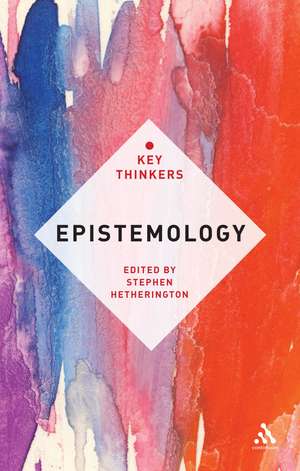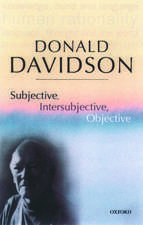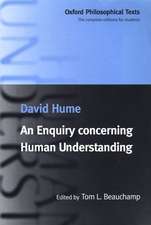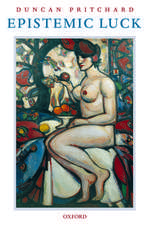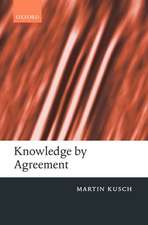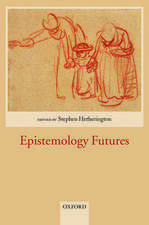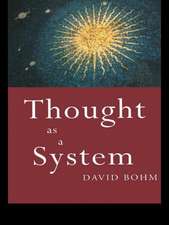Epistemology: The Key Thinkers: Key Thinkers
Editat de Professor Stephen Hetheringtonen Limba Engleză Paperback – 25 apr 2012
| Toate formatele și edițiile | Preț | Express |
|---|---|---|
| Paperback (2) | 167.24 lei 6-8 săpt. | |
| Bloomsbury Publishing – 26 iun 2019 | 167.24 lei 6-8 săpt. | |
| Bloomsbury Publishing – 25 apr 2012 | 191.38 lei 6-8 săpt. | |
| Hardback (2) | 498.24 lei 6-8 săpt. | |
| Bloomsbury Publishing – 26 iun 2019 | 498.24 lei 6-8 săpt. | |
| Bloomsbury Publishing – 25 apr 2012 | 770.13 lei 6-8 săpt. |
Preț: 191.38 lei
Preț vechi: 222.08 lei
-14% Nou
Puncte Express: 287
Preț estimativ în valută:
36.62€ • 38.00$ • 30.61£
36.62€ • 38.00$ • 30.61£
Carte tipărită la comandă
Livrare economică 18 martie-01 aprilie
Preluare comenzi: 021 569.72.76
Specificații
ISBN-13: 9781441153968
ISBN-10: 1441153969
Pagini: 264
Ilustrații: black & white illustrations
Dimensiuni: 138 x 216 x 15 mm
Greutate: 0.34 kg
Ediția:New.
Editura: Bloomsbury Publishing
Colecția Continuum
Seria Key Thinkers
Locul publicării:London, United Kingdom
ISBN-10: 1441153969
Pagini: 264
Ilustrații: black & white illustrations
Dimensiuni: 138 x 216 x 15 mm
Greutate: 0.34 kg
Ediția:New.
Editura: Bloomsbury Publishing
Colecția Continuum
Seria Key Thinkers
Locul publicării:London, United Kingdom
Caracteristici
Historical account engages students with the development of philosophical thinking about knowledge.
Notă biografică
Stephen Hetherington is Professor of Philosophy at the University of New South Wales, in Sydney, Australia. He has written several books, including Good Knowledge, Bad Knowledge (Oxford University Press, 2001), Self-Knowledge (Broadview, 2007), and How To Know (Wiley-Blackwell, 2011). He has edited two books, including Epistemology Futures (Oxford University Press, 2006).
Cuprins
Notes on Contributors \ 1. Epistemology's Past Here and Now, Stephen Hetherington \ 2. Plato's Epistemology, Nicholas D. Smith \ 3. Aristotle on Knowledge, Robert Bolton and Alan Code \ 4. Ancient Scepticism, Gisela Striker \ 5. The Epistemology of Descartes, Desmond M. Clarke \ 6. Locke, Berkeley, Hume: Epistemology, P. J. E. Kail \ 7. Kant and Kantian Epistemology, Melissa McBay Merritt and Markos Valaris \ 8. American Pragmatism: Fallibilism and Cognitive Progress, Christopher Hookway \ 9. Wittgenstein on Knowledge, Paul Snowdon \ 10. Quine, Goldman and Two Ways of Naturalizing Epistemology, Ram Neta \ 11. In Gettier's Wake, John Turri \ 12. Epistemology's Future Here and Now, Stephen Hetherington \ Index
Recenzii
'There has long been a serious need for a systematic look at the history of epistemology. This volume, written by experts on the various figures who have done so much to shape epistemology as it now is, will go a long way toward filling that gap. It should be essential reading for epistemologists and historians alike.'
'The best history of philosophy is the wellspring of insightful metaphilosophy. This volume is a prime example of both. As these essays so vividly show, the history of epistemology may be a singularly bountiful supply of metaphilosophical insights, for the sharpness of its main problems and the complexity in its most seductive failures.'
Contemporary Epistemology is often practised in historical void. This excellent collection of essays broadens the landscape, by tracing its origins from Plato to modern and contemporary philosophers. This healthy historical cure will help a lot of students and teachers in epistemology to see better where their problems come from.
'The best history of philosophy is the wellspring of insightful metaphilosophy. This volume is a prime example of both. As these essays so vividly show, the history of epistemology may be a singularly bountiful supply of metaphilosophical insights, for the sharpness of its main problems and the complexity in its most seductive failures.'
Contemporary Epistemology is often practised in historical void. This excellent collection of essays broadens the landscape, by tracing its origins from Plato to modern and contemporary philosophers. This healthy historical cure will help a lot of students and teachers in epistemology to see better where their problems come from.
